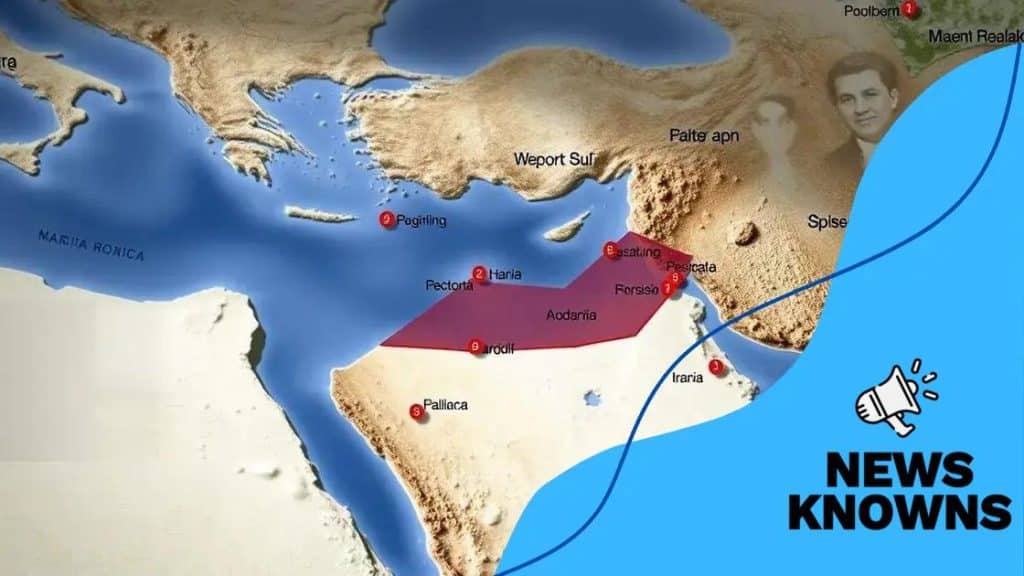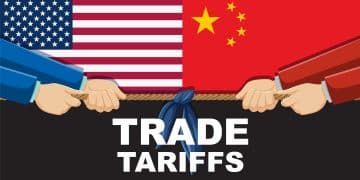Trump Persian Gulf naming policy: what you need to know

Anúncios
The Trump Persian Gulf naming policy influences international relations by shaping perceptions, impacting alliances, and altering public opinion, which in turn affects U.S. foreign policy and trade dynamics in the region.
The Trump Persian Gulf naming policy has stirred various discussions that reach far beyond geopolitical maps. Are you curious how this affects not just politics, but also cultural perceptions? Let’s delve into its significance.
Anúncios
Understanding the Trump Persian Gulf naming policy
The Trump Persian Gulf naming policy represents a significant shift in how the U.S. views its foreign relationships, particularly with nations bordering the Persian Gulf. This policy not only reflects changes in political attitudes but also influences cultural perceptions across the region.
Background of the Naming Policy
To understand this policy, it’s essential to recognize its historical context. For decades, the Persian Gulf has been a focal point in geopolitical discussions. The naming conventions used have evolved, often influenced by political agendas and international relations.
In recent years, the naming has become a sensitive topic. As the U.S. has strengthened ties with some countries while distancing itself from others, the terminology used has mirrored these changes.
Anúncios
Key Elements of the Policy
- Geopolitical Dynamics: The policy reshapes how the U.S. interacts with Middle Eastern nations.
- Public Perception: The naming can influence how citizens perceive their own government and its foreign policies.
- Cultural Impacts: Language can affect cultural identity and how regions view themselves on the global stage.
This policy has wider implications beyond mere terminology. By adopting specific names, the U.S. signals its stance and priorities in the region. It’s essential to recognize that these decisions are not taken lightly; they involve extensive considerations from political advisors and international experts.
As the policy develops, ongoing discussions and debates about its effects on international relations will likely continue. Observers should pay close attention to how changes in language can reflect shifts in diplomatic relations.
Historical context of Gulf naming conventions
The historical context of Gulf naming conventions reveals how international politics have shaped the language used to describe this vital region. Over the years, naming has reflected shifts in power dynamics, alliances, and conflicts.
Initially, the term “Persian Gulf” was widely accepted and used in international maps and discussions. However, as regional politics evolved and nations sought greater identity and representation, the naming conventions began to change.
Significant Historical Shifts
Various events have influenced naming in the Gulf, such as:
- The Rise of Nationalism: As countries like Iran and Iraq asserted their identity, they promoted names that aligned with their cultural narratives.
- The Discovery of Oil: The Gulf’s importance increased in global commerce, leading to conflicts over the narrative surrounding the region.
- Colonial Influence: Western colonial powers played a significant role in how the Gulf was referenced in international discourse.
Today’s discussions around the Trump Persian Gulf naming policy are grounded in this rich history. Each term we use carries weight and meaning that transcends mere geography.
Understanding the historical context allows us to appreciate why certain names evoke strong sentiments and how they can impact diplomatic relationships. The debates over naming are not just about words; they represent deep-rooted cultural and political legacies that continue to shape the region.
Impacts on international relations

The impacts on international relations due to the Trump Persian Gulf naming policy are profound and multi-faceted. Names carry weight, symbolizing relationships and political positions, which in turn can affect diplomacy and trade.
As countries react to this policy, we see shifts in alliances and tensions in the region. The naming choices made by the U.S. can influence not just bilateral relations but also the broader geopolitical landscape.
Key Impacts
Several main effects arise from this policy:
- Shifts in Alliances: The naming policy may cause countries to reassess their partnerships based on perceived slights or endorsements.
- Cultural Reactions: How nations interpret the names can lead to cultural confrontations or cooperation among different groups.
- Trade and Economics: The terminology may lead to changes in how nations engage economically, potentially impacting trade agreements.
Moreover, the reactions to the naming policy can create a ripple effect. Countries in the region may lobby for changes or support new initiatives based on how these names are perceived.
As the Trump Persian Gulf naming policy impacts international dialogue, keeping an eye on the resultant changes is crucial for understanding future relations amongst nations involved.
Public opinion and reaction
The public opinion and reaction to the Trump Persian Gulf naming policy have been varied and intense. Many individuals and groups around the globe are closely monitoring how this policy reshapes narratives in the Middle East.
Some segments of the population view the policy positively, believing it establishes a clearer role for the United States in the region’s dynamics. Others feel that the naming is counterproductive, igniting tensions instead of fostering dialogue.
Voices of Support
Supporters often emphasize:
- Clarity in Foreign Policy: They argue that specific names can create clear expectations for international relations.
- Strengthening Alliances: Some believe that positive associations with certain names can foster better ties with allies.
- Cultural Recognition: Advocates claim that names can highlight and respect the historic narratives of certain countries.
Conversely, many critics express concern about the negative consequences that the naming policy may unfold. There are fears that it could exacerbate long-standing disputes in the region.
Criticism and Concerns
Common criticisms include:
- Provoking Regional Tensions: Detractors worry that this policy plays into historical rivalries, increasing animosity.
- Neglecting Local Perspectives: Critics argue that it sidelines the voices and opinions of the very people who live in the region.
- Potential for Diplomatic Fallout: Concerns are raised about the implications for U.S. relations with other countries in the Gulf.
The divide in public opinion reflects wider global views on U.S. involvement in international politics. As reactions to the Trump Persian Gulf naming policy unfold, they will likely shape future discussions and diplomatic efforts.
Future implications for U.S. foreign policy
Future implications for U.S. foreign policy are likely to be influenced significantly by the Trump Persian Gulf naming policy. As global dynamics shift, the way the U.S. engages with countries in the region may evolve in response to changing perceptions and alliances.
First, this policy could lead to a re-evaluation of partnerships. Countries that feel slighted by the naming might seek to distance themselves from the U.S. This could leave gaps that other nations, like Russia or China, may be eager to fill.
Potential Shifts in Alliances
We could see:
- Realignment of Regional Powers: Nations may reassess their ties, leading to new alliances that challenge U.S. influence.
- Increased Collaboration with Non-Western Countries: Countries may look towards Russia or China for partnerships as alternatives to U.S. engagement.
- Stronger Nationalist Sentiments: The naming policy may stir national pride, resulting in stronger resistance to foreign influence.
Furthermore, long-term effects may also play out in trade. The choices made today regarding how the Gulf is represented can impact negotiations in the future.
Trade Relations
Possible scenarios include:
- Changes in Trade Agreements: Nations may push back against U.S. policies, affecting economic cooperation.
- Economic Partnerships with Other Regions: Countries may seek new markets, limiting reliance on U.S. imports and exports.
- Potential for Economic Sanctions: If tensions rise, countries may use economic strategies to assert their positions.
The Trump Persian Gulf naming policy is more than just a political statement; it lays the groundwork for future interactions and must be closely monitored for its potential consequences on U.S. foreign policy.
FAQ – Frequently Asked Questions about the Trump Persian Gulf Naming Policy
What is the Trump Persian Gulf naming policy?
It refers to the naming conventions and diplomatic terminology used by the Trump administration regarding the Persian Gulf region.
How does this policy affect U.S. foreign relations?
The policy may influence alliances, trade relations, and how nations perceive U.S. involvement in the Middle East.
What are the public reactions to this naming policy?
Public opinion has been mixed, with some supporting clearer language while others criticize it as potentially provocative.
Why are naming conventions important in diplomacy?
Naming conventions can shape perceptions, influence cultural identity, and impact the relationships between nations.





